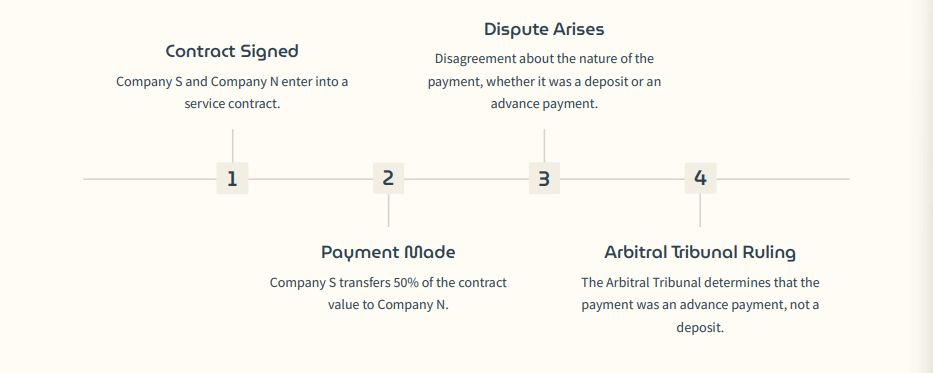- within Corporate/Commercial Law topic(s)
- within International Law topic(s)
This case brief analyzes a legal case in Vietnam concerning a service contract dispute between two companies. The central issue revolves around the classification of a payment made by Company S to Company N, whether it constitutes a deposit or an advance payment. The Arbitral Tribunal's ruling, reasoning, and the legal principles involved are discussed, along with practical lessons for drafting unambiguous contracts.
Facts
Company S (the Plaintiff) and Company N (the Defendant) entered into a service contract, where Company S agreed to pay Company N for services. After the contract was signed, Company S transferred an amount equal to 50% of the total contract value to Company N. Subsequently, the parties fell into a disagreement about the nature of this payment.
Company S argued that the payment was a deposit, intended to secure the performance of the contract, as per a clause in the contract that used the term "deposit." This clause stated that if the project could not be executed by December 31, 2014, Company N would have to return 50% of the contract value, which Company S had already paid as a "deposit." In contrast, Company N contended that the payment was simply an advance payment, not a deposit, and therefore should not be subject to the legal consequences of a deposit under the Civil Code.
The Arbitral Tribunal, after reviewing the contract and the conduct of the parties, determined that the payment was not a deposit but rather an advance payment. The Tribunal emphasized the absence of punitive terms typically associated with deposits, which would ensure that the receiving party is held to a higher standard of performance or face penalties for non-performance.

Issue
How should courts or arbitral tribunals determine whether a payment made under a contract is a deposit or an advance payment?
Holding
The Arbitral Tribunal ruled that the payment in question was an advance payment and not a deposit. The Tribunal concluded that the absence of any penalty for non-performance and the explicit provisions regarding the return of the payment suggested that the payment was not meant to secure contract performance in the manner of a deposit.
Reasoning
The Tribunal carefully analyzed the language of the contract, focusing on the nature and purpose of the payment in question. While the contract did use the term "deposit," it did not establish the punitive mechanism that is typically triggered in cases of depositrelated disputes. Specifically, under Vietnamese law, deposits are intended to ensure that parties are incentivized to perform their obligations, often by imposing a penalty for non-performance (e.g., forfeiting double the deposit as per Article 358 of the 2005 Civil Code and Article 328 of the 2015 Civil Code).
The contract in this case, however, did not provide for any penalty in the event that Company N failed to perform its obligations. Instead, it merely required Company N to return the payment if the contract was not fulfilled. This return mechanism, the Tribunal noted, is characteristic of advance payments rather than deposits. The absence of punitive clauses suggested that the payment was intended as an advance toward the contract price, rather than as a security deposit.
Additionally, the Tribunal referenced Decree 163/2006/ND-CP, which specifies that in cases where the parties do not clearly define whether a payment is a deposit or an advance, the payment will be presumed to be an advance payment. Given the ambiguity in the contract and the absence of punitive terms, the Tribunal held that the payment should be treated as an advance.
Legal Principles
- Article 358 of the 2005 Civil Code & Article 328 of the 2015 Civil Code: A deposit serves to secure contract performance and may entail punitive measures (e.g., forfeiting double the deposit) if the receiving party fails to fulfill the contract.
- Decree 163/2006/ND-CP, Article 29: If a payment is made without clear specification of whether it is a deposit or an advance payment, it shall be presumed to be an advance payment unless otherwise agreed.
- Contractual Interpretation: Where contract terms are ambiguous or unclear, tribunals and courts will consider both the explicit language of the contract and the legal principles governing the nature of payments (e.g., deposits vs. advance payments).
Lessons for Practice
1 Clear Contractual Language
When parties intend for a payment to serve as a deposit, the contract should explicitly state the punitive consequences in case of non-performance. Merely using the term "deposit" is not sufficient if the contract lacks enforcement or penalty mechanisms.
2 Advance Payments vs. Deposits
Practitioners should be aware of the significant legal distinctions between deposits and advance payments. An advance payment is simply a prepayment that must be refunded if the contract is not performed, while a deposit serves as a performance security and may involve penalties if obligations are not fulfilled.
3 Avoiding Ambiguity
To prevent disputes, parties should clearly define the nature of payments in their contracts. If the parties agree that a payment is a deposit, they should avoid including terms that contradict the punitive aspects of a deposit (such as merely refunding the payment), which may lead to the payment being reclassified as an advance payment.
4 Relying on Legal Frameworks
In cases of uncertainty, the legal framework, such as the Civil Code and relevant decrees, provides guidance on how to classify payments. Awareness of these frameworks can help parties draft more precise and enforceable contracts.
The content of this article is intended to provide a general guide to the subject matter. Specialist advice should be sought about your specific circumstances.


